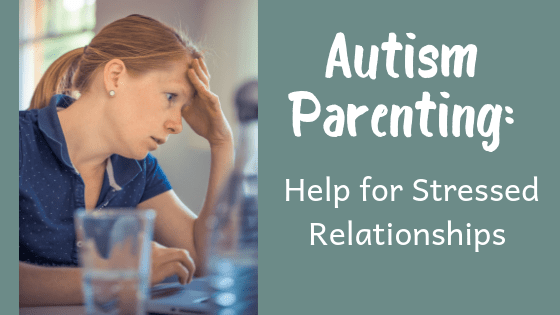
Having a child with autism, Down syndrome or any other type of special needs brings all kinds of new realities into your life. Some can be amazing – like gaining a whole new community of people you may have never met before. But other things can definitely add stress to the lives of autism parents. From more doctor appointments to navigating special education and IEPs, to scheduling therapies – all of these new realities can put stress on your relationships with your spouse, your family members and your friends.
With the help of Allie Young-Rivard, LLPC, we’ve compiled some information and resources to help autism parents with relationships that may be under stress.
Marriage – The odds are NOT stacked against you
There’s an often-quoted statistic that the divorce rate among parents who have a child with autism is around 80%. Or it’s at least quoted as being higher than the general population. This outdated figure was based on older, smaller studies, which can often lead to inaccurate data.
The Interactive Autism Network, which connects the autism community and researchers, breaks down the updated research findings in their article Under a Looking Glass: What’s the Truth About Autism and Marriage?:
“Researchers in Baltimore investigated the supposed 80 percent divorce rate for parents of a child with autism spectrum disorder (ASD). Unlike other studies, this one was particularly large – using data from almost 78,000 parents, 913 of whom had a child with autism – and included families from across the United States. The bigger the study, the less likely the results are due to chance or something unique about the pool of people studied. The researchers, from Kennedy Krieger Institute and Johns Hopkins University, found no evidence of an 80 percent divorce rate.9 In fact, parents of children with autism split up as often as parents of children who don’t have autism, according to their research.”
We hope this new information encourages you that even though you may face some stress in your marriage due to your child’s diagnosis, it doesn’t automatically mean your marriage is doomed because of autism. If your marriage is struggling, ask for help before it’s too late.
When Divorce Does Happen
Even with this hopeful news for couples who have an autistic child, there are still a lot of marriages under stress. Deciding to divorce is complex and difficult. This life-altering course can cause intense anxiety. It can also cause worry about how the decision to separate will affect your children. For parents of children with special needs, the choice to separate and/or divorce is particularly difficult because of the added needs and responsibilities.
Support for Your Child
Many children on the autism spectrum have difficulty adapting to change. So naturally it is common for parents to worry how their child will acclimate to their new reality, routine and living situation. It is important to prepare your child for the changes that are going to happen. Providing your child with a visual schedule that outlines the custody arrangements will help them know what to expect. Having consistency at both houses will also be helpful. Work together to have a similar calendar at both locations that shows your child’s daily routines and notes what house he or she will be at. By using tools that prepare them you can help them understand their new routine and hopefully reduce some anxiety. Additionally, talking about the schedule ahead of time to avoid surprises is beneficial for everyone involved.
Another helpful idea is to create a social story explaining the changes and what to expect. If your child receives ABA therapy, talk with their BCBA about creating a personalized social story to prepare them for their new routine and the changes in their family situation.
Lastly, depending on the age of the child and their communication ability, seeking a therapist who specializes in adjustment could be helpful. We have counselors on our team who work with children and teens on the autism spectrum. Seeing an experienced therapist can help children process their new family dynamics and adjust to the changes. Please contact us if you would like to pursue counseling for your child.
Co-parenting
It is important for a divorced couple to remember that is it about the child (or children). The definition of co-parenting is:
Verb; (especially of a separated or unmarried couple) share the duties of parenting (a child).
Keeping your focus on doing what is best for your child can help both parents stay on track and follow through on maintaining routines. Establishing and upholding proper communication with your former spouse will ensure support and success for your child. If communication with your ex is difficult, seek out family counseling and/or individual therapy if your former spouse is unwilling to join you. Counseling can help you learn how best to work together for the common interest of your child.
Family or Friends Who Don’t Understand Your Child’s Unique Needs
When your child is diagnosed with a disability it can often feel like you’re alone. Those close to you may not understand what you’re going through as you navigate therapies, doctors, support at school and situations that are difficult for your child. Some may spend less time with you and your family. This often stems from not really understanding the diagnosis. When a family member or close friend expresses criticism of your child’s behavior, or of you as a parent, it’s important to address it.
You can first try to explain what your child’s diagnosis means, how it impacts them medically, emotionally, behaviorally, etc. Explain the therapies and medical treatments they are receiving and why. Talk about what their education situation is like and how it benefits them. If your child has sensory issues, repetitive behaviors or stimming, difficulty with change, etc, it’s good to take time to explain them to your family. Being open and honest can help your loved ones understand and hopefully lead to support from them.
Is It Time To Set Boundaries?
If, however, after explaining all of these things, they isolate you or stop talking with you, first know that it’s not you or your child. It is their inability to be sensitive and understanding of differences and supportive of those with unique needs. If you are facing criticism or lack of understanding toward your child, you may need to establish boundaries. This may mean limiting time spent at family gatherings, or not taking your kids to their grandparents’ house.
Whatever the situation you are facing, it’s important to remove yourself from unsupportive relationships and find support from others in similar situations. Setting boundaries with unsupportive family members can be tough, but putting your mental health and the child’s well being first is beneficial for everyone. Additionally, a professional counselor can help you develop coping skills to navigate strained relationships, as well as help you process your own feelings regarding your child’s diagnosis.
We hope you’ve found this information and ideas for autism parents helpful as you encounter stress in various relationships. And if you find you need some outside help and perspective, please reach out to us!
Know others who would benefit from reading this? Use the buttons below to share it with your community:

